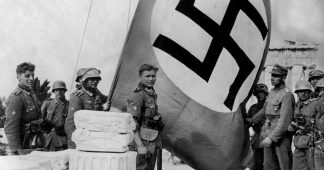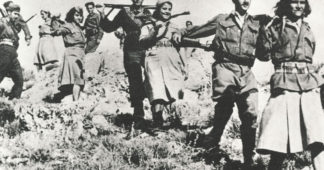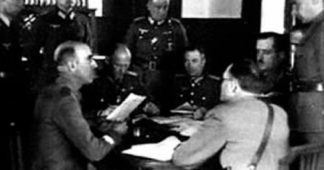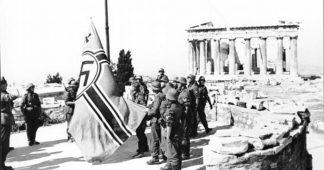The Greek resistance involved armed and unarmed groups from across the political spectrum that resisted the Axis occupation of Greece in the period 1941–1944, during World War II. The largest group was the Communist-dominated EAM–ELAS. The Greek Resistance is considered one of the strongest resistance movements in Nazi-occupied Europe, with partisans, men and women known as andartes and andartisses controlling much of the countryside prior to the German withdrawal from Greece in late 1944.
Origins
The rise of resistance movements in Greece was precipitated by the invasion and occupation of Greece by Nazi Germany (and its allies Italy and Bulgaria) from 1941 to 1944. Italy led the way with its attempted invasion from Albania in 1940, which was repelled by the Greek Army. After the German invasion, the occupation of Athens and the fall of Crete, King George II and his government escaped to Egypt, where they proclaimed a government-in-exile, recognised by the Allies. The British greatly encouraged the King to appoint centrist, moderate ministers; only two of his ministers were members of the dictatorial government that had governed Greece before the German invasion. Despite that, some in the left-wing resistance claimed the government to be illegitimate, on account of its roots in the dictatorship of Ioannis Metaxas from 1936 to 1941.
The Germans set up a collaborationist Greek government, headed by General Georgios Tsolakoglou, before entering Athens. Some high-profile officers of the pre-war Greek regime served the Germans in various posts. This government however, lacked legitimacy and support, being utterly dependent on the German and Italian occupation authorities, and discredited because of its inability to prevent the cession of much of Greek Macedonia and Western Thrace to Bulgaria. Both the collaborationist government and the occupation forces were further undermined due to their failure to prevent the outbreak of the Great Famine, with the mortality rate reaching a peak in the winter of 1941–42, which seriously harmed the Greek civilian population.
First resistance acts
Although there is an unconfirmed incident connected with Evzone Konstantinos Koukidis the day the Germans occupied Athens, the first confirmed resistance act in Greece had taken place on the night of 30 May 1941, even before the end of the Battle of Crete. Two young students, Apostolos Santas, a law student, and Manolis Glezos, a student at the Athens University of Economics and Business, secretly climbed the northwest face of the Acropolis and tore down the swastika banner which had been placed there by the occupation authorities.
The first wider resistance movements occurred in northern Greece, where the Bulgarians annexed Greek territories. The first mass uprising occurred around the town of Drama in eastern Macedonia, in the Bulgarian occupation zone. The Bulgarian authorities had initiated large-scale Bulgarization policies, causing the Greek population’s reaction. During the night of 28–29 September 1941 the people of Drama and its outskirts rose up. This badly-organized revolt was suppressed by the Bulgarian Army, which retaliated executing 300–500 people in Drama alone. An estimated fifteen thousand Greeks were killed by the Bulgarian occupational army during the next few weeks and in the countryside entire villages were machine gunned and looted.[citation needed] The town of Doxato and the village of Choristi are officially considered today Martyr Cities.
At the same time, large demonstrations were organized in Greek Macedonian cities by the Defenders of Northern Greece (YVE), a right-wing organization, in protest against the Bulgarian annexation of Greek territories.
Armed groups consisted of andartes – αντάρτες (“guerillas”) first appeared in the mountains of Macedonia by October 1941, and the first armed clashes resulted in 488 civilians being murdered in reprisals by the Germans, which succeeded in severely limiting Resistance activity for the next few months. However, these harsh actions, together with the plundering of Greece’s natural resources by the Germans, turned Greeks more against the occupiers.
Continue reading aten.wikipedia.org
We remind our readers that publication of articles on our site does not mean that we agree with what is written. Our policy is to publish anything which we consider of interest, so as to assist our readers in forming their opinions. Sometimes we even publish articles with which we totally disagree, since we believe it is important for our readers to be informed on as wide a spectrum of views as possible.











